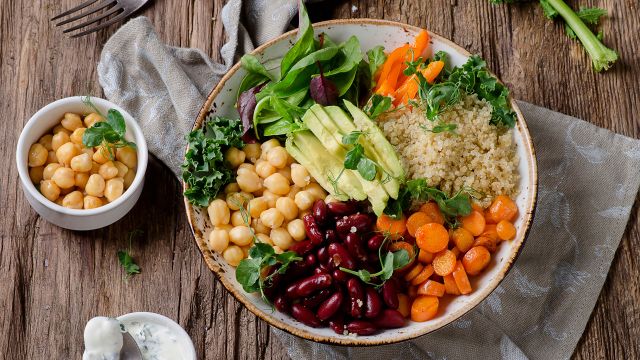Updated on November 1, 2022.
If you’ve read anything about healthy eating plans for people with diabetes, you’ve probably seen the term “plant-based diet.” But what does it mean?
It’s simple: It means the lion’s share of your plate features vegetables, legumes, beans, fruit, and whole grains.
Here’s what you need to know about a variety of plant-based diet options and how they might work for you as part of your diabetes care plan.
You have options
If you’re curious about following a plant-based diet, there are several types to choose from, all of which will help you manage your diabetes:
- Vegans eliminate animal products completely; their diets are 100 percent plant-based.
- Lacto-ovo vegetarians eat eggs and dairy products, but no meat, fish, or poultry.
- Pescatarians give up meat and poultry but still eat fish.
- Semi-vegetarians, or flexitarians, still eat animal products, but only in small amounts. Both the Mediterranean diet and the DASH (Dietary Approaches to Stop Hypertension) diet qualify as semi-vegetarian and are recommended by the American Diabetes Association and highlighted in the USDA’s Dietary Guidelines for Americans 2020-2025.
Plant-based diets offer benefits
Switching to a balanced, plant-based diet changes the mix of nutrients you consume every day. This should help your overall health and your diabetes in several ways.
For one thing, vegetarian and vegan diets are naturally high in fiber, which helps lower blood sugars and decreases the need for prescription medications for people with type 2 diabetes. Some research has found that these diets are even more effective for controlling blood glucose than counting carbohydrates, a traditional approach for people taking insulin.
You’ll also likely be eating fewer animal products, a major source of saturated fat, which increases your risk of cardiovascular disease. Reducing or eliminating saturated fat is associated with lower blood pressure and cholesterol levels.
People who follow vegetarian diets tend to eat fewer overall calories than meat-eaters do, as well. In studies that compare vegetarian or vegan diets to conventional diabetic diets, participants on the plant-based diets often lose more weight.
There are potential downsides to consider
Plant-based diets can increase your risk of deficiency for a few important nutrients.
Vitamin B12 is found mostly in animal products. Though it’s present in some dairy items, fermented beans and vegetables, certain mushrooms, and other plant-based foods, B12 deficiency among vegetarians and vegans is common. If your healthcare provider (HCP) has prescribed you metformin, you’re already at risk of a B12 deficiency, as the drug reduces levels of the vitamin. Among other issues, B12 deficiency may cause mental and visual disturbances, as well as mouth ulcers and problems with motor control.
Omega-3 fatty acid intake tends to be lower in vegetarians and vegans than in people who eat more animal products, but omega-3 fatty acids offer several protections to people with diabetes. They lower risk of cardiovascular disease and retinopathy and improve kidney function. Your HCP may recommend that you take a vegetarian-friendly, algae-based omega-3 supplement to make up for your reduced intake.
Iron, vitamin D, and calcium deficiencies are also common among vegetarians and vegans, but their effect on diabetes specifically isn’t clear. Talk to your HCP or dietitian about whether you need to take supplements.
Despite some potential dietary deficiencies that can be managed with supplements, a plant-based diet can help you control your diabetes and could even prevent complications.







